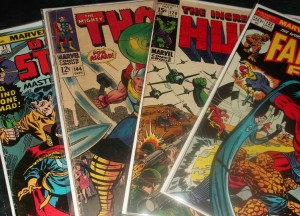What is a comics-forward comic book convention? The fact that we even have to have this type of designation clearly shows how the shift in comic book conventions has changed over the years. The designation shows the difference between an actual comic book convention and a media convention which happens to have some comic book vendors and guests.

2010 Detroit Fanfare comic book convention
What a Comics-Forward Convention is Not
I would venture to say that most comic book conventions in the U.S. and Canada right now are not comics-forward comic book conventions. The evidence of this comes in how the shows are marketed and floor-planned. Instead of showing top comic book creators in their ads, actors from movies and shows which have nothing to do with comic books are headlined. While comic book creators might be at the convention, they are forced to take a back seat to soft-core porn stars or former Playboy centerfolds. Instead of every booth seat being filled by someone with a connection to comic books, autograph tables are sold to former pro-wrestlers. The creators are forced to fill tables in the back of the convention hall or in some out-of-the-way wing.
Moment of Digression
Let’s pick on pro-wrestlers for a moment since a wrestling guest can show the difference between a comics-forward comic book convention and an average “comic book convention.” Even though they wear tights, they are not superheroes nor do they have some type of connection to superheroes. Don’t get me wrong as there are some wrestlers which have direct connections to the comic book world. I would not scoff at CM Punk being a guest at a comic book convention since he is a collector. I would also not turn my nose to Sgt. Slaughter or Hulk Hogan since they were both characters in comics in the 1980s. When it comes to [Insert name of pro-wrestler], though, he/she has no connection to comics so he/she is only there to take space away from someone you will actually give a damn about.
A Comics-Forward Comic Book Convention
Instead of booking non-comics-related media guests, a comics-forward comic book convention might schedule stars which have either worked on comics or starred in movies or TV shows which were based on comic book properties. Instead of pushing the media guests first, the comic creators and comic book vendors have primary seating around a convention hall at a comics-forward comic book convention. Some comics-forward comic book conventions don’t schedule any media guests at all.
The Focus
Simply put, most comic book conventions place the focus on washed-up media stars which have nothing to do with the industry which the convention states it is attempting to appeal to instead of putting the focus on comic book fans. I want to walk in to a convention and believe the show was built around me and not around someone else. I don’t want to get an autograph from [Insert name of pro-wrestler or floozy], I want an autograph from someone who was part of the entertainment medium I grew up with and continue to enjoy to this day.

My Favorite Example
I stared covering Detroit Fanfare for a major website when the convention began in 2010. I loved the idea of a convention which had comics for sale and comic book creators signing autographs in the front of the hall. Instead of having to search a map for where the creators could be seen, I could trip over them if I was not paying attention. There are media guests, but they are guests which have some type of connection to comics. There are panels to attend, but most have to do with comics and not with non-comics-related TV shows or movies which I am not even interested in watching. Now, I am happy to be a part of a comics-forward comic book convention where the masses are welcomed, but the show is molded for the true comic book fan.



